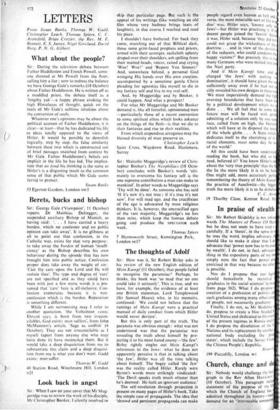The thoughts of Adolf
Sir: How was it, Sir Robert Birley asks in his review of the new English edition of Mein Kampf (11 October), that people failed to recognise the paranoiac? Perhaps, he thinks, the book was 'so mad that no one could take it seriously'. This is true, and we have, for example, the evidence of at least one British statesman, Lord Templewood (Sir Samuel Hoare) who, in his memoirs, confessed : `We could not believe that the rantings of Mein Kampf were a practical manual of daily conduct from which Hitler would never deviate'.
But this is only part of the truth. The paranoia was obvious enough : what was not understood was that the paranoiac was revealing the truth about himself by pro- jecting it to his most hated enemy—'the Jew'. Birley rightly singles out Mein Kampf's references to the Jews: what he does not apparently perceive is that in talking about `the Jew', Hitler was all the time talking about himself. The bogey called `the Jew' was the reality called Hitler. Rarely were Byron's words more strikingly vindicated: `The Devil speaks truth much oftener than he's deemed : He hath an ignorant audience.'
The self-revelation through projection is present on many pages of Hitler's book. Take the simple case of propaganda. The idea that `shrewd and persistent propaganda can make
people regard even heaven as hell an versa, the most miserable sort of life as disc' was, • Hitler says, `known only Jews'—but Hitler was practising it. If decent people joined the `Jewish Soci it was, Hitler said, because 'they did not could not grasp the wickedness of the doctrine ... and in view of the devilish of the seducers, who could condemn the happy victims?' But precisely this is many Germans who were misled into the Nazi party.
And if Mein Kampf time and charged `the Jews' with seeking 'w domination', it should have given the a sufficiently away even if he had not e citly revealed his own designs in these wo `We must imperatively demand the rig, overstep boundaries that have been di by a political development which we r diate . . . We all feel that in some di future man will be faced with pro, admitting of a solution only by one sui. race, called from on high, the Herren which will have at its disposal the rest) of the whole globe . . . A State which dedicates itself to the cherishing of its racial elements, must some day be m of the world.'
All this could have been underst reading the book, but who did, or read, believed it? You know Hitler's about the 'very true principle' that the the lie the more likely it is to be bell One might add, more accurately perha ' remembering the theory of Mein Kampf the practice of Auschwitz—the bigger truth the more likely it is to be disbelie
ha r.
C. C. Aros
19 Thurlby Close, Kenton Road, H


















































 Previous page
Previous page